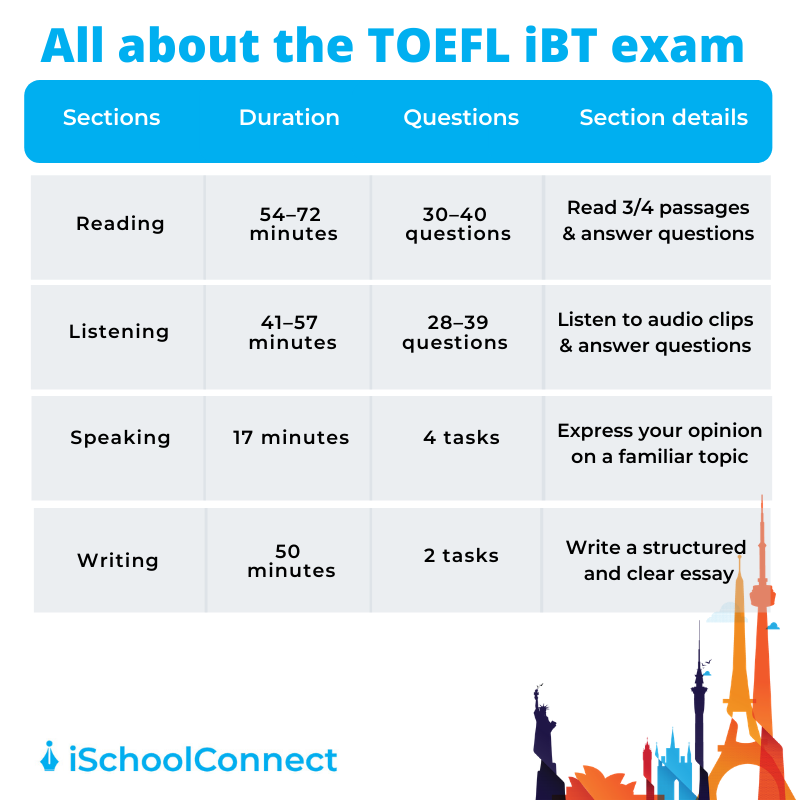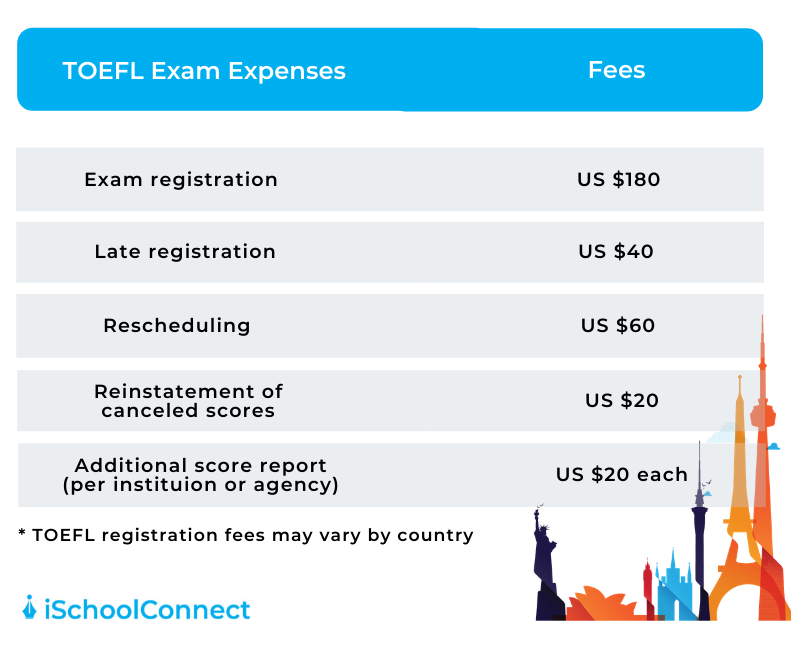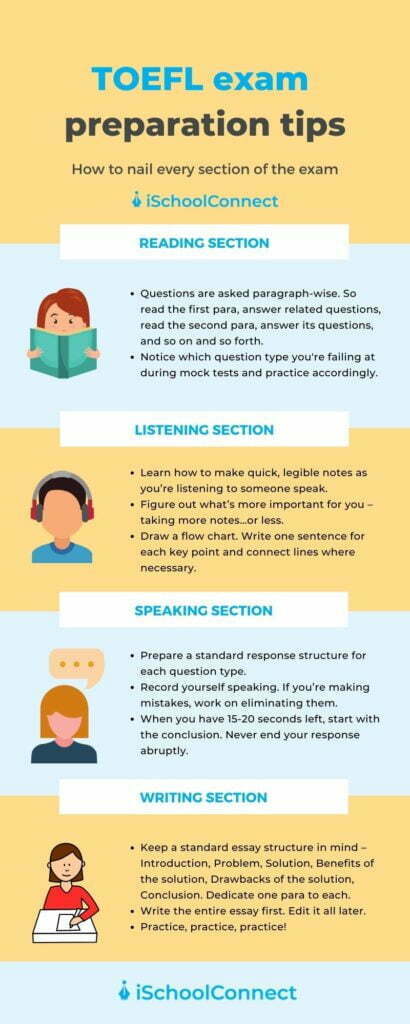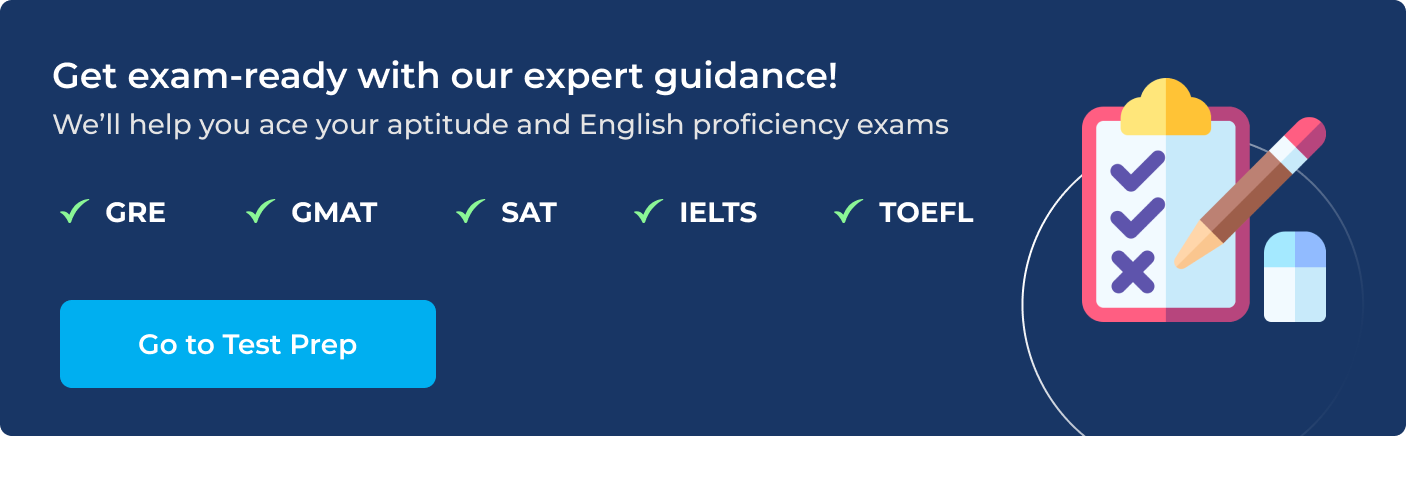Table of Contents
Here’s Everything You Need to Know About the TOEFL Exam!
The Educational Testing Service conducts the TOEFL exam throughout the year because of its importance for students wishing to study abroad. Gathering all the required information on TOEFL exam preparation or syllabus can be hectic for a student already occupied with getting the required grades for his dream school. This is where we can help – by telling you all you need to know about the exam pattern, syllabus, and tips and giving you a TOEFL sample test!
What’s It About?
The TOEFL exam was first administered in 1964 in the USA. The TOEFL exam full form is the Test of English as a Foreign Language. With the passage of time, many institutions have grown to accept it as their official English proficiency tool. While the TOEFL exam is available in internet-based (TOEFL iBT) and paper-delivered formats, 98% of TOEFL test takers worldwide opt for the TOEFL iBT test due to the convenience and ease of the testing manner. Some of the top countries that accept TOEFL include:
- The United States of America
- Canada
- Australia
- New Zealand
- The United Kingdom
- And many other institutions across Europe and Asia
These tests are organized up to 50 times every year, and a student can choose to appear in any of these slots. However, you cannot take the exam more than once in a 3-day period. Remember that every time you register for a test, you must pay the fee.
TOEFL Exam Pattern
TOEFL exam contains 4 different sections. Below you can find the four sections with details.

The TOEFL Exam Syllabus Consists of 4 Major Sections
- Reading
- Listening
- Speaking
- Writing
TOEFL Exam Syllabus Consists of Reading Comprehension
The test’s reading section consists of 3-4 multiple-focus passages (compare/contrast, cause-effect). Each passage consists of 10 questions. The time allotted to this section can vary between 54-72 minutes, depending on the number of passages given in the test. The scores for this portion of the test can range between 0 and 30. You can take a look at the TOEFL practice test for reading right here.

TOEFL Exam Syllabus Consists of Listening Skills
This section contains 3 to 4 lectures, and some lectures contain classroom discussions. Each lecture is around 3-5 minutes long, and at the end of each, you will be asked 6 questions. Also included in this portion are normal, daily-life conversations. You’ll get to listen to 2-3 conversations, each being 3 minutes long. You’ll be asked 5 questions at the end of each conversation. The accents used in the listening portion are those of native speakers from all over North America. Apart from North American accents, you might also hear some accents from other English-speaking countries like:
- Australia
- New Zealand
- The United Kingdom
The total time allotted to this section can vary between 41-57 minutes and the score for this portion of the test is between 0 and 30. A sample of the listening section can be found here.
TOEFL Exam Syllabus Consists of Speaking Proficiency
This portion of the test consists of 4 tasks. You’ll be assigned 1 independent task to express your opinion on a topic you’re familiar with. You’ll have 30 seconds to prepare your response. Apart from that, you will have 3 integrated speaking tasks based on reading and listening. You’ll have 1 minute to prepare your response. The total time allotted for this section is 17 minutes. You’ll be scored out of 0-4 points; then, your points will be converted to a scale between 0 and 30. An example of the speaking section can be found here. This example is 11 seconds long, and you have 45 seconds to respond.
TOEFL Exam Syllabus Consists of Writing Abilities
You’ll have two tasks in this section of the test.
- Section 1: An integrated task based on what is read and heard. You’ll have 20 minutes to complete this.
- Section 2: An independent task to support an opinion on a topic. You’ll have 30 minutes to complete this.
The total time allotted to this section is 50 minutes, and you’ll be scored on a point range of 0 to 5, which will then be converted to a score scale of 0 to 30.
TOEFL Exam Scores
The total score for the TOEFL test can range between 0 and 120. The authorities responsible for checking the test include a combination of certified Educational testing service raters and AI. You will receive your scores online 6 days after the test date. You will get a hard copy of the reports within 11 days of your exam.
TOEFL Exam Fee

The fee for the TOEFL exam can vary from country to country. US high school senior candidates can also apply for a TOEFL fee reduction. However, international students have to pay the full cost. You can find more about the test fee here.
TOEFL Sample Test
Here are links to some TOEFL sample test you should use for practice!
- Sample reading test
- Sample listening test
- Sample writing test
- Sample speaking test
Tips for the TOEFL Exam
Relax! TOEFL preparation isn’t as hard as it seems. If you’re nervous on your way to the examination center, sweating buckets upon buckets, don’t panic! Everyone goes through it. Being nervous is a positive sign of taking the task seriously.
Starting your preparation and feeling lost about not knowing where to start is a feeling we all have gone through. Here are a few section-wise tips to help you prepare for the exam apart from TOEFL sample test-

Reading Practice Tips
- The questions in the Reading section appear para-wise for each comprehension. A good way to not feel lost is to read the first part, answer the relative questions, read the second paragraph, answer questions for that one, and so on and so forth.
- For some people, reading the questions first and the passage later helps. See if that works for you.
- As you’re attempting each question, notice the question type. It may be a question asking the purpose behind a certain statement, a sentence insertion question, or a vocabulary testing question. At the end of the test, notice which question type you’re failing to answer and improve your score accordingly.
Listening Practice Tips
- There are two key skills that come into play during this section – your ability to concentrate and your writing speed. Yes, your writing speed. Learn how to make quick, legible notes as you’re listening to someone speak. Use a shorthand, if necessary.
- For some students, the more they focus on listening, the better they remember. Others feel the need to make notes so they can refer to them at a later stage. Figure out what’s more important for you – taking more notes…or less.
- Draw a flow chart. Start at the beginning – write one sentence for each key point mentioned, and connect lines where necessary. This will help you map out what you heard.
Speaking Practice Tips
- Prepare a standard response structure for each question type. For example, in the first Independent Task, you can dedicate the first sentence to stating the task, state your opinion and supporting arguments, and end with a conclusion. This way, you’ll have a format in mind and won’t feel baffled when presented with a question.
- Record yourself speaking. Check if you’re pausing for long durations or if you’re saying ‘umm’ or ‘oh’ a lot. Work on eliminating them.
- As soon as you see you have 15-20 seconds left, start stating your conclusion. Never end your response abruptly.
Writing Practice Tips
- Keep a standard essay structure in mind – Introduction, Problem Statement, Solution, Benefits of the solution, Drawbacks of the solution, and Conclusion. Dedicate each para to one heading, and understand that they do not necessarily have to be in this order.
- Write the entire essay first. Don’t listen to the critical side of your brain just now. Once you’ve finished your first draft, you can always come back and edit.
- If there is one writing tip one could never give enough of, it’s this – practice, practice, practice!
If you’re unsure where to start, you can find a free TOEFL sample test here.
Remember: Practice is key and can make the difference between a good and a bad test score.
Don’t be overconfident! Even if you’re a native speaker, your overconfidence can get the better of you. It’s always important to go through and understand the format because the best performers get lost in the formalities.
Always remember to do your share of research. Sometimes the test can be unpredictable and will often dish out more questions to specific candidates. ETS does that to make test scores comparable across administrations, or it can even be a new question they are trying to see how it performs in real testing conditions. Either way, questions that are extra do not usually count toward your score.
Key Takeaways
- The TOEFL is essentially one of the most important tests in every student’s academic life.
- A great TOEFL score adds immense value to your academic achievements and can also help you with several scholarship opportunities.
- Preparing well and going the extra mile will help you ace the test.
- Over 35 million people sit for the TOEFL exam every year with high hopes of getting into a good institution.
- iSchoolConnect helps you shortlist universities according to your student profile, TOEFL scores, and preferences.
We hope this article has helped you in clearing all your doubts about the TOEFL test. Check out our other blogs on the IELTS exam, TOEFL vs. IELTS, most preferred universities by Indian students, myths students have about studying abroad, New York University, and many more.
Liked this blog? Read: 5 useful tips on how to prepare for TOEFL with detailed study plans
FAQs
Q1. What is the TOEFL exam used for?
Answer – The TOEFL iBT exam is the most popular English language test for study, work, and immigration. Depending on which English-speaking country and university you choose, you will have to take this exam to pursue your study abroad dreams.
Q2. Is the TOEFL exam very hard?
Answer – The TOEFL exam is said to be easier than other tests such as SAT, ACT, and GRE. Prepare well for the exam and keep taking practice tests.
Q3. How many times can we write the TOEFL?
Answer – There is no limit to the number of times you can take the TOEFL test but you can’t take it more than once in a 3-day period.








